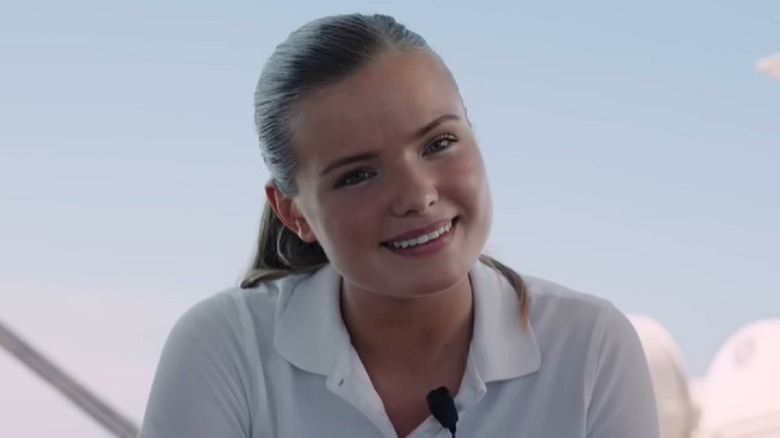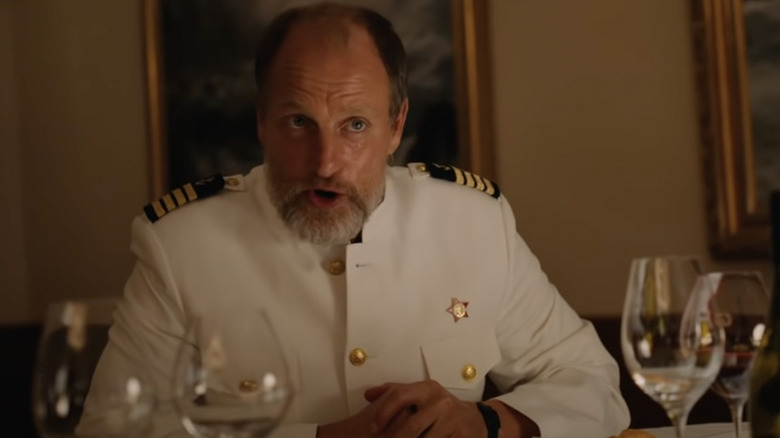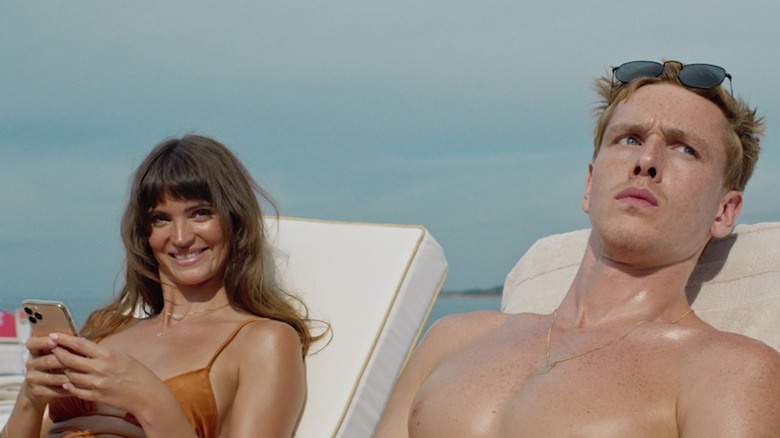Triangle Of Sadness Review: All Aboard The Boat Trip From Hell
- Consistently funny for the vast majority of its epic runtime
- Excellent performances from a well utilized ensemble of character actors
- Often too broad and obvious in its satire to be as cutting as it needs to be -- even if it never stops being funny
- Certain characters suffer from being written as simplistically as they are
There's no metaphor for the state of the world right now that's more on the nose than the standout sequence of "Triangle of Sadness," the Palme D'Or-winning satire from writer/director Ruben Östlund. On a luxury cruise for the super-rich and the Instagram influencers trying to pass themselves off that way, the socialist captain (Woody Harrelson) and a wealthy Russian businessman known as the "king of s**t" are arguing over their opposing political ideologies. As this unfolds, the ship is rapidly sinking, everybody on board has caught food poisoning, and a series of burst pipes have led everybody on board to roll around in their own vomit and feces — the metaphor for how we're too busy focusing on trivial issues to make any substantial change to the world about as subtle as a sledgehammer, but no less amusing for it. Like much in "Triangle of Sadness," the laughs make up for how well-worn its social satire is.
Much like his previous effort, 2017's "The Square," Östlund's comedic targets prove to be wider-ranging than the narrative actually caters for, the film at times becoming as adrift at sea as the one-percenters stranded aboard his yacht. "Triangle of Sadness" could never be accused of lacking comedic inspiration, finding new ways to tackle the subject of class warfare and the vanity of influencer culture every five minutes, and managing to land the gags on almost every occasion. But as everything is in service to whichever joke he aims to tell at any given moment, the whole thing eventually feels as artificial as the images those influencers put out to the world; he leaves an ensemble of well-utilized comedic performers left struggling to avoid caricature due to the broad strokes with which every character is written.
A consistently funny film, even though its satire is lacking
Before we board the yacht, we're introduced to Carl (Harris Dickinson) and Yaya (Charlbi Dean, in her final screen performance), a young couple facing financial strain. He's a budding male model, but one with very few commissions, whereas she's a success; the introductory half-hour stretch focusing on the couple proves to be the most focused Östlund is throughout, more successful in examining the themes that get lost beneath the bodily fluids later on. It's a consistently funny exploration of how gender and class roles don't necessarily correlate, which all stems from the age-old argument over who pays for dinner — the man, as is stereotypically expected, or the woman who earns considerably more.
Östlund recognizes the inherently ridiculous nature of any social interaction that's defined by outdated gender roles and manages to find the more realistic modern spin on this topic, with what should be a potentially sexist minefield becoming a half-hour exploration of contemporary male insecurity, with Dickinson perfectly cast as the man-child caught too proud to outwardly state that he's a cheapskate. The themes of class and gender are subverted in a mirror-image third act, although the insights aren't quite as sharp as they are in this opening stretch; after the film climbs on board the boat, we enter a more heightened reality where the jokes get broader, and the commentary less subtle to the point of losing nearly all intended effect. It's just as funny, but nowhere near as cutting as the comparatively stripped-back opening act.
On board the yacht, we stray slightly away from Carl and Yaya to shine a light on the other rich passengers and the hierarchy of workers there to serve them (think of it as "Downton Abbey" on a cruise, but with significantly more poop jokes, and you're halfway there). As the film becomes a more sprawling ensemble piece, the vast majority of the characters fail to register beyond their singular comedic hooks, be they elderly British arms dealers, or a wheelchair-bound German woman who after an accident can only utter the phrase "in the Clouds." When it comes to poking fun at the super-rich, this emptiness in character is partially by design, but when the focus shifts to the workers underneath them in the food chain, this lack of depth becomes deeply frustrating.
Too broad in its humor for its own good
In the third act, a cleaner named Abigail (Dolly de Leon) becomes the narrative's driving force; the class structure of those on board the ship is turned neatly on its head, but the film doesn't quite land the satirical punch it aims for due to the lack of time spent with the character prior to the concluding chapter. Again, there's humor in the broad strokes here — it's hard not to laugh at the mega-rich adapting to their new social functions after a toilet cleaner becomes their key to survival — but a lack of focus when it comes to fleshing out the character herself. Again, this is no fault of Leon's performance, which is innately attuned to Östlund's deadpan comedic register, so much as it is the screenplay. Abigail functions largely as a stand-in for the entire lower working class hired to tend to the whims of those who consider themselves above her, becoming apparent very early on that she's written largely to contrast with Dickinson's clueless male lead. She's a character that should be richer than the comedic caricatures she's hired to look after but is written with an equal lack of depth the performance can only partially overcome.
While the screenplay is far from flawless, Östlund once again proves to be one of the most adept filmmakers when it comes to creating an eye-catching set piece, taking the influence from grim Euro auteurs like Michael Haneke and pushing that into the realm of cringe comedy. It was apparent in 2014's "Force Majeure" (remade in the U.S. as Will Ferrell's vehicle "Downhill"), where an avalanche unfolding in one unbroken take is the starting point for a cutting character study of an overgrown man-child, and in 2017's "The Square," where the world of modern performance art was the grounding for an exploration of social boundaries being annihilated. Here, in addition to the aforementioned diarrhea blowout — which isn't quite as disgusting as the sick bags handed out at festival screenings would make you believe — Östlund manages to stage his absurdist set pieces on a grander scale than he's managed before. Lost beneath the discourse of the food poisoning sequence is the arguably even better gag involving a bottle of Nutella, an elaborately staged non-sequitur that looks like it cost a not-inconsiderable chunk of the budget. It's also a moment that captures the whims of the 1% with more assurance than much of the film around it, a broad gag that manages to ground itself in something more specific than a lot of the director's material.
"Triangle of Sadness" is one of the year's funnier films, but despite its status as a Cannes-winning epic, proves to be the rare satire better enjoyed with your brain switched firmly off. The film hits U.S. theaters on Friday, October 7.


